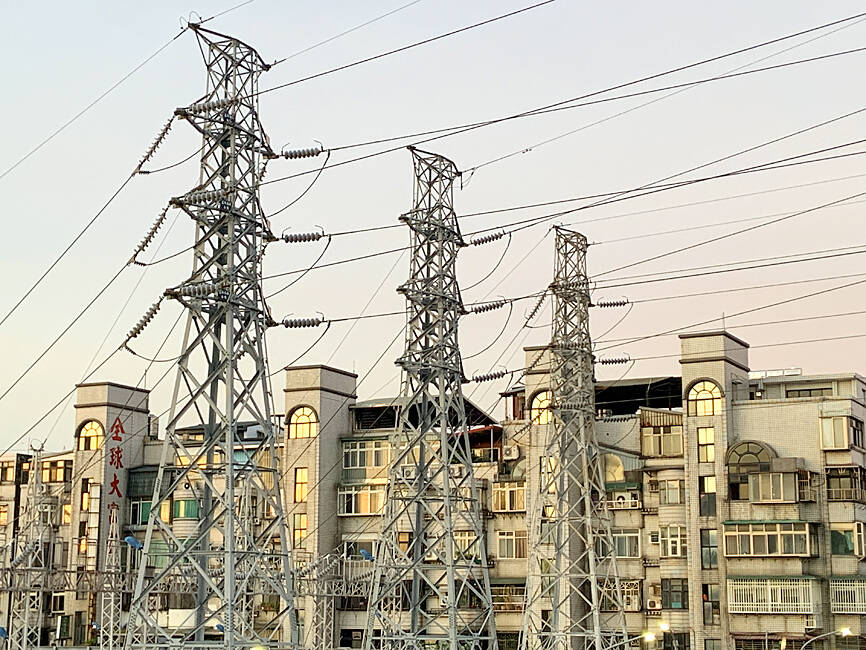Power consumption by industrial sectors last month declined from a year earlier, indicating that the business expansion cycle for the semiconductor industry has plateaued and could head toward a slowdown, the Taiwan Research Institute (台灣綜合研究院) said yesterday.
The electricity prosperity index (EPI), which the institute uses to gauge the health of industrial sectors, showed that energy consumption shrank 0.29 percent from a year earlier, the New Taipei City-based institute said.
The reading for heavy industrial users decreased 2.25 percent as global demand for electronics is losing momentum, it said, urging policymakers to heed the economic implications.

Photo: Tu Chien-jung, Taipei Times
Taiwan supplies 60 percent of the chips used in high-performance computing, laptops, big data analysis, automobiles and Internet of Things applications.
Global demand for advanced and mature chips remains strong in light of a double-digit percentage increase in power consumption among fabs, but sales of other semiconductor products are floundering, it said.
It is the third straight month the EPI has flashed a “flat” climate signal, meaning the boom in the semiconductor sector might have peaked and companies should plan for a slowdown ahead, the institute said.
The US, the largest end-market for consumer electronics, slipped into a technical recession in the first half, while strict COVID-19 controls are constraining economic activity in China. Together, the two markets account for more than 50 percent of Taiwan’s exports.
Electricity usage by non-technology manufacturers also displayed a negative cyclical movement and the technology sectors could not rescue the situation as they did last year.
Inflationary pressures are taking a toll on demand for base metals, and plastic and chemical products, the institute said.
Electricity generated via combined heat and power systems in June slumped 17.7 percent, the worst retreat in history, as suppliers purchased energy directly from state-run Taiwan Power Co (台電) to cope with spiking power generation costs, it said.
The EPI reading and softening export orders lent support to the forecast of an economic slowdown, but power consumption among service providers such as retailers, restaurants, hotels and recreational facilities increased 13.26 percent year-on-year, as people resumed gathering and dining out despite the lingering domestic COVID-19 outbreak, the institute said.
The institute earlier predicted that the nation’s economy expanded 3.3 percent in the first half of the year, weaker than the government’s 3.38 percent forecast.

To many, Tatu City on the outskirts of Nairobi looks like a success. The first city entirely built by a private company to be operational in east Africa, with about 25,000 people living and working there, it accounts for about two-thirds of all foreign investment in Kenya. Its low-tax status has attracted more than 100 businesses including Heineken, coffee brand Dormans, and the biggest call-center and cold-chain transport firms in the region. However, to some local politicians, Tatu City has looked more like a target for extortion. A parade of governors have demanded land worth millions of dollars in exchange

Taiwan Semiconductor Manufacturing Co’s (TSMC, 台積電) revenue jumped 48 percent last month, underscoring how electronics firms scrambled to acquire essential components before global tariffs took effect. The main chipmaker for Apple Inc and Nvidia Corp reported monthly sales of NT$349.6 billion (US$11.6 billion). That compares with the average analysts’ estimate for a 38 percent rise in second-quarter revenue. US President Donald Trump’s trade war is prompting economists to retool GDP forecasts worldwide, casting doubt over the outlook for everything from iPhone demand to computing and datacenter construction. However, TSMC — a barometer for global tech spending given its central role in the

An Indonesian animated movie is smashing regional box office records and could be set for wider success as it prepares to open beyond the Southeast Asian archipelago’s silver screens. Jumbo — a film based on the adventures of main character, Don, a large orphaned Indonesian boy facing bullying at school — last month became the highest-grossing Southeast Asian animated film, raking in more than US$8 million. Released at the end of March to coincide with the Eid holidays after the Islamic fasting month of Ramadan, the movie has hit 8 million ticket sales, the third-highest in Indonesian cinema history, Film

Alchip Technologies Ltd (世芯), an application-specific integrated circuit (ASIC) designer specializing in server chips, expects revenue to decline this year due to sagging demand for 5-nanometer artificial intelligence (AI) chips from a North America-based major customer, a company executive said yesterday. That would be the first contraction in revenue for Alchip as it has been enjoying strong revenue growth over the past few years, benefiting from cloud-service providers’ moves to reduce dependence on Nvidia Corp’s expensive AI chips by building their own AI accelerator by outsourcing chip design. The 5-nanometer chip was supposed to be a new growth engine as the lifecycle